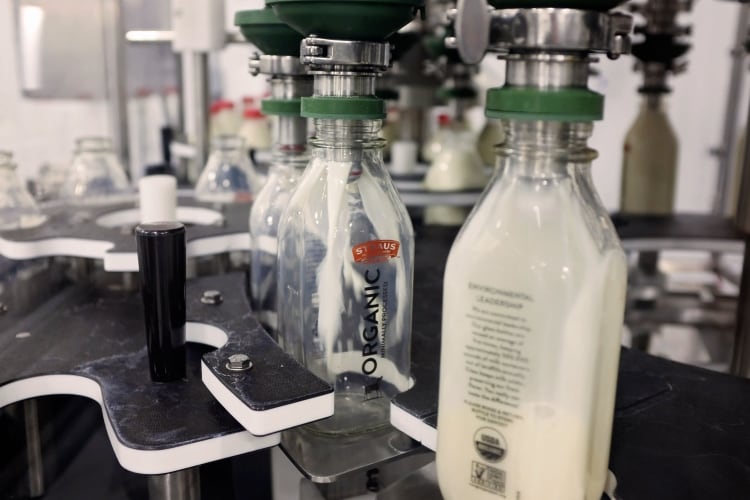The new creamery, a 50,000 square foot facility, is producing its entire line of 72 retail and foodservice organic dairy products made from certified organic milk from 12 small-scale family farms, averaging 250 cows per dairy, in Marin and Sonoma counties.
Innovative practices to reduce waste and use renewable energy are the primary focus of the company’s sustainability strategy. The new facility focuses the company on becoming more efficient as a manufacturer while allowing more advanced sustainable practices, such as zero-waste production in the future.
In 2019, the Marshall creamery was the first in the world to receive TRUE Zero Waste Certification, and the goal is for the Rohnert Park location to obtain the same certification. The company is pursuing ways to eliminate fossil fuel-based plastic packaging, implementing a roadmap over the next several years to shift away from its current plastic packaging. The new creamery has a reusable glass bottle program, which currently includes its Straus Organic Cream-Top Milk, Organic Chocolate Milk, Organic Half & Half, and Organic Heavy Whipping Cream products.
“This is a huge step in our company’s history. This new facility gives us a greater focus on fulfilling our mission to sustain family farms and revitalize rural communities while creating a financially viable, replicable carbon-neutral farming model and sustainable food production,” said Albert Straus, founder and CEO, Straus Family Creamery.
Straus Family Creamery said it can now increase the capacity of its current dairy products and enter new organic dairy categories. It said it can also look to expand its network of farmers from the current 12 certified organic dairy farms.
To help improve operating efficiencies throughout the production facility and help Straus Family Creamery achieve long-term growth, the company hired Doug Reid as vice president of manufacturing operations and supply chain.
“In order to grow our mission to sustain local dairy farms, this facility enables improved quality and process controls to deliver on future growth,” said Reid.
“This creamery also allows additional capacity to process more organic milk, producing premium organic dairy products to meet the demand in the marketplace.”
The original Marshall creamery could process up to 20,000 gallons of fluid milk each day; the new plant will double that quantity in the future. Qualtech, a company that specializes in designing dairy manufacturing plants, designed and built the eco-conscious and efficient creamery.
“Our goal was to design new technologies that adapted to the existing minimally processed model that Straus has had in place for nearly three decades,” said André Giguère, founder and CEO, Qualtech.
“Our machines were built to ensure that the products would retain the texture and authentic Straus dairy taste while minimizing the impact on the environment.”
Current climate-smart features at the Rohnert Park creamery include: 97% carbon-free electricity; LED lighting with smart controls throughout the new plant; reduced employee commute: overall miles driven by approximately 85 creamery employees will be decreased by around 70%, reducing employee transportation emissions by more than 300 metric tons of CO2e per year; 10 electric vehicle charging stations for employees to charge EVs at no cost; and a 5,000 square foot drought-resilient landscape with more than 200 trees, flowering plants, shrubs, hedges, and grasses that conserve water, create pollinator habitats and foster ecological resilience.
Other potential enhancements include new technologies related to water capture and reuse, heat recapture, and more sustainable processes for cleaning the plant.

